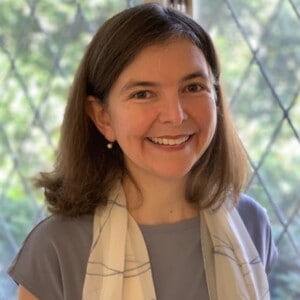Gretchen (Ernster) Henderson is a Senior Lecturer at the Steve Hicks School of Social Work and was a 2020-2022 Faculty Fellow in the Humanities Institute, focusing on Environmental Humanities.
Her current research and teaching interests focus on environmental arts and humanities, aesthetic histories, sustainable collaborative stewardship of cultural heritage, performative archives, integrative sciences and social practices. Based in creative writing and literature, her work has been shaped by interdisciplinary approaches across the arts, environmental studies, cultural histories, music, comparative media studies, museum studies, disability studies and health humanities, social work and public humanities.
Her fifth book, Life in the Tar Seeps: A Spiraling Ecology from a Dying Sea (Trinity University Press 2023), grew from her 2018-2019 Annie Clark Tanner Fellowship in Environmental Humanities at the University of Utah, where she focused on Great Salt Lake and stories of watersheds in the climate crisis. An excerpt of this book was Notable in Best American Essays 2020 with invited arts-based offshoots including LA+: Landscape Architecture Plus, Holt-Smithson Foundation, Utah Museum of Fine Arts, and other digital tributaries and invited co-authored publications with the Luc Hoffmann Institute/World Wildlife Fund International in Conservation Biology and Nature Sustainability. She was awarded the 2023 Aldo & Estella Leopold Writing Residency in New Mexico, as well as a 2022 fellowship from the Women’s International Studies Center.
Henderson is the author of four additional books, including two works of nonfiction, Ugliness: A Cultural History (Reaktion Books of London/University of Chicago Press 2015) and On Marvellous Things Heard (Green Lantern Press 2011). Her novels interrelating the arts and disability studies include The House Enters the Street (Starcherone Books 2012) and Galerie de Difformité (&NOW Books/Northwestern University Press 2011), alongside poetry and photographic chapbooks, exhibited media works, and performed opera libretti at MIT and Georgetown. Her writings have been published in Ecotone, Ploughshares, The Kenyon Review, Notre Dame Review, Iowa Review, Southern Review, Denver Quarterly, Performance Research, The Journal of Artists’ Books, The &NOW Awards: The Best Innovative Writing, and many other journals and anthologies. Her latest book was translated into Spanish, Turkish, Korean, and Chinese editions, also forthcoming in Arabic, with interviews on NPR and BBC Radio.
Henderson has served on the faculties at Georgetown University, University of Utah, MIT, and other colleges and community settings, including the Kenyon Review Writers Workshop and Oak Spring Garden Foundation. Some recent commitments include being the inaugural Associate Director for Research at the Harry Ransom Center at UT-Austin and Co-Director of a National Endowment for the Humanities (NEH) Institute on Museums: Humanities in the Public Sphere at Georgetown University in collaboration with the University of California-Santa Cruz. Her interdisciplinary work has been supported by fellowships including the Hodson Trust-JCB Fellowship in Creative Arts at Brown University and Mellon Postdoctoral Fellowship in the Humanities at MIT. Her music collaborations have been supported by Opera America and MIT’s Center for Art, Science & Technology. Her recent environmental writing projects benefited from immersions at the Jan Michalski Foundation for Writing and Literature in Switzerland, Taft-Nicholson Center for Environmental Humanities in Montana, and Rockefeller Foundation’s Bellagio Center in Italy.
A musician by training, she is interested in acoustic ecologies and communal practices of listening, meditation, and other processes to sound the gaps of cultural and institutional histories, to facilitate participatory spaces for social justice and equity.
Professional Interests
Social histories and cultural representations, creative writing and literary arts, environmental and health humanities, collaborative stewardship of cultural heritage, public humanities.


